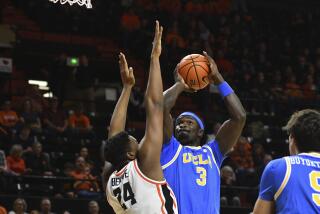Basketball Player Dies After Stroke
- Share via
Earnest Killum, who decided to play basketball for Oregon State after he was found to have a blood-clotting disorder, died Monday, three days after suffering his second stroke in six months.
Dr. Carl Orfuss, a neurologist at Daniel Freeman Memorial Hospital in Inglewood, who treated Killum, said that his death was not related to playing basketball.
“It is the opinion of myself and all the physicians who treated Earnest here that he succumbed to a disease affecting the blood vessels and that his resumption of basketball in no way precipitated the terminal event,” Orfuss said.
The 20-year-old sophomore guard was pronounced dead at 3 p.m., Orfuss said in news conference at the hospital. He said an autopsy was scheduled for this morning.
Killum, who only gained medical clearance to join the team in late December, suffered a stroke last Friday when he collapsed at a hotel.
He appeared to be improving, but lapsed into a coma early Sunday, team doctor Richard Cronk said. He was placed on a respirator after his condition worsened.
Orfuss said that during the 24 hours after he had gone into a coma, Killum lost all brain function.
“On behalf of Oregon State University, we wish to extend our deepest and most sincere condolences to Earnest’s family,” said Athletic Director Dutch Baughman, who had remained in Los Angeles to be with Killum’s family.
“We are sure that the OSU basketball team and all others who had the privilege to know Earnest are also deeply saddened by this great loss. Earnest has been an inspiration for all of us. We admire his talent and we respect his character, his faith and his dedication.”
Killum, named the California 5-A prep player of the year in 1989, had a blood clot removed from his left arm after suffering a mild stroke last July.
Other, inoperable clots were discovered, including one in the main artery leading to Killum’s brain.
Killum, who had to sit out his freshman season because of academic problems, found his college career was in jeopardy without him ever playing a game.
Doctors began treating him with Coumadin, an anticoagulant drug whose side effects include “an increase in bruisability or an increase in bleeding,” said Gae Ryan, assistant director of pharmacy at University Hospital in Portland.
The risk of internal injuries seemed great if Killum was allowed to play basketball. But his condition improved and after a battery of tests at Oregon Health Sciences University in Portland, he was cleared to join the team Dec. 27.
A specialist, who asked Oregon State officials not to identify him, determined that the anticoagulant dosage could be reduced to lessen the risk of a bleeding injury.
Killum was feeling great in the days leading up to his collapse, Oregon State Coach Jim Anderson had said, and was making a triumphant return to his hometown of Los Angeles.
On Wednesday night, he attended a ceremony at his alma mater, Lynwood High School, where his number was retired. On Thursday night, he scored 13 points in 16 minutes against Southern Cal.
Anderson said recently that he was not concerned about Killum’s health after he was cleared to play.
“It was just my trust in the medical opinion and the trust in him and the way he said he was feeling,” Anderson said. “To be honest with you, it just didn’t enter my mind.”
When Killum failed to show up for the bus as the team prepared to leave for practice, trainer Mike Sandago found him semiconscious with his legs dangling in a hot tub at the Airport Hilton.
He was rushed to Daniel Freeman Hospital, where he initially was listed in fair condition. Cronk said Killum had suffered “a very significant stroke” and was partially paralyzed.
On Saturday, the Beavers played second-ranked UCLA and lost 87-81 in overtime in an effort inspired by concern for their stricken teammate. They were unaware that his condition had deteriorated until they arrived in Corvallis on Sunday.
More to Read
Go beyond the scoreboard
Get the latest on L.A.'s teams in the daily Sports Report newsletter.
You may occasionally receive promotional content from the Los Angeles Times.










